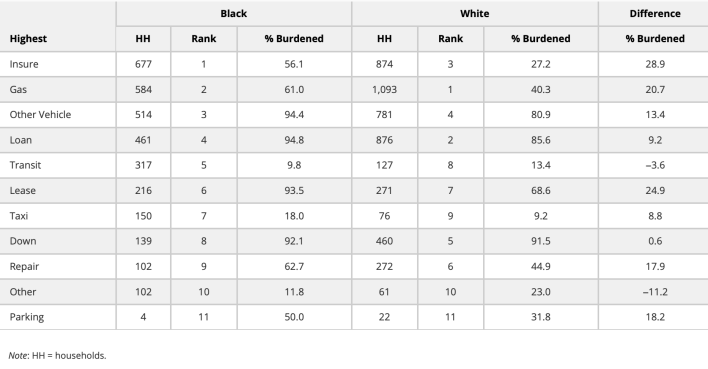The economic burden of owning a car is hitting Black families far harder than white ones, a new study finds — and its authors argue that making driving optional for more Americans is the only meaningful strategy to cure that disparity.
Researchers at the University of Connecticut recently found that a stunning 76 percent of Black households in the U.S. that owned cars are spending more than 15 percent of their income on vehicle-related expenses every month, which the researchers (and many personal finance experts) say qualifies them as "cost-burdened" on their transportation bills. A still-troubling 60 percent of white households met that same threshold, which the Bureau of Transportation Statistics — again, troublingly — says is the average transportation spend for U.S. households of any race.
Worse, those disparities held true regardless of income, with even high-income Black households more likely to be cost-burdened than their white counterparts. Low-income Black households meanwhile, spent an average of $1,115 more per car every year than their impoverished white peers — an amount equivalent to nearly nine percent of the annual earnings of a single person living at the federal poverty line.

Those findings complicate the perennial narrative that families of all races spend about the same amount on transportation — a phenomenon the researchers say has more to do with the fact that Black households are three times more likely not to have access to a car at all than any real societal equity.
And just like many Black transit users have little choice but to rely on networks that don't always meet their needs, the researchers argue that many Black drivers are also "captive" to an auto-centric transportation system that leaves them no choice but to rack up steep automotive bills, especially in cities where transit doesn't exist at all.
"When there’s an 'equity' piece of a transportation plan, they tend to talk about 'captive [transit] riders,' and the need to provide service for people who don't necessarily have other options," said Dr. Quinn Molloy, the lead author of the paper. "But there's a much larger cohort of people who struggle with the cost of car ownership. ... The consistency of how much [Black drivers] are spending in general, I think, is pretty mind blowing.”
Molloy and her co-authors found that Black households are spending disproportionately more on every automotive expense category, which will make the total costs of car ownership exceedingly difficult to bring down.
Thanks in part to the racist predatory auto lending crisis, a stunning 95 percent of Black drivers met thresholds for being cost-burdened on their loans alone, and 94 percent of those who leased or otherwise financed their cars were struggling to pay those bills, too. And that's to say nothing of the spiraling court costs and jail time that often follow if the car note doesn't get paid. (Critically, the researchers did not find evidence that a cultural preference for more expensive cars played a role in this disparity.)
Black families also spent more on gasoline despite owning fewer cars and driving fewer miles, which the researchers suspect is because they're more likely to buy inefficient, older vehicles to offset soaring costs in other automotive categories. And despite driving older models that should theoretically be cheaper to repair, they also spent an average of $2,545 a year on insurance, making them nearly twice as likely to be cost-burdened on that measure than their white counterparts.
Other researchers have linked that last phenomenon to higher rates of car crashes in predominantly Black neighborhoods — thanks in large part to the deadly roads that were disproportionately built through them by predominantly white transportation officials, sending road death rates in BIPOC communities skyrocketing in the process.
“Having better transit is not just an issue of movement," said Norman Garrick, co-author of the study. "It's also a poverty reduction strategy that will help a lot of people in this country ... It’s ironic that what we're arguing for here are the kind of dense, transit-friendly places that are already available to people of means. But [what do we say to] the rest of the population? ‘Well, you can go to hell.’"
Of course, massive lending reform, revolutionizing the entire insurance industry, and fighting the uphill political battle of better fuel efficiency standards could reduce some of these disparities between drivers of different races. The study authors, though, argue that forcing millions of Americans to become "captive" drivers will always be an expensive proposition even if these policies shift — at least when compared with the cost of giving people other ways to get around.
Black transit users do better
In the same paper, the researchers found that Black transit users were actually less likely to be cost-burdened than their white peers, with only 10 percent of the former spending more than 15 percent of their income on fares, compared to 13 percent of the latter. And the researchers say both groups could shrink even further with subsidized tickets and improved service that allows agencies to run more efficiently as buses and trains fill.
Transit investments would also cut noxious air pollution and address climate change — and do so far more efficiently than public investment in electric car subsidies, whose steep up-front costs often prove insurmountable for even moderate-income families. And if Black families end up paying more to buy, maintain, and insure EVs, it could deepen those social divides even further.
“The findings reinforce the fact that the solution to greenhouse gas emissions is going to be quite difficult to achieve without expanding public transportation," added co-author Carol Atkinson-Polombo.
By focusing on providing mobility alternatives for the Black households that suffer most from compulsory car ownership, the study authors say transportation reform can be a powerful tool to reduce poverty, racial inequality, and climate change. And along the way, we'll also illuminate just how inherently unaffordable mass automobility has always been — even for those that don't have centuries of structural racism piled on their shoulders, too.
"The difference in spending between households that do not own cars and households who do own cars is so significant," added Molloy. "Of course, the differences between car owners who are Black and car owners who are white is very important. But the idea of encouraging demotorization, I think, is really important here, too — because everyone is spending so much on their vehicles.”






